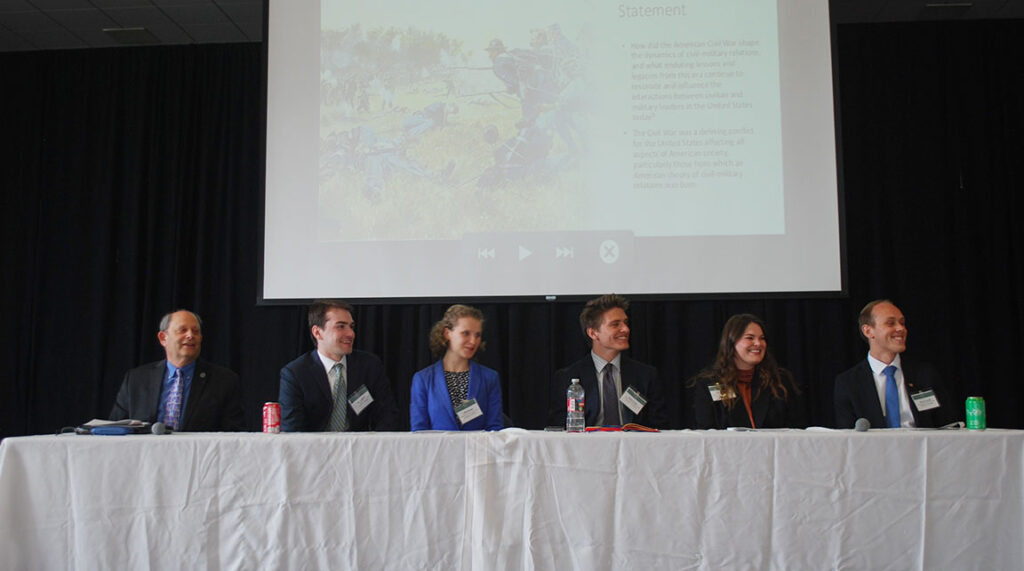DU Korbel Graduate Students participate in N3SP forum on national security and homeland defense. N3SP
MAYA JOHNSON
National security students from five Colorado universities gathered at the U.S. Air Force Academy in April 2024 to exchange ideas, increase awareness and foster cooperation in national security and strategic studies. The 2024 National Security Strategic Studies Partnership Forum (N3SP) also aimed to strengthen relations between universities, military commands and key industries such as aerospace, cyber and defense within Colorado.
This year’s forum included five panels and a session featuring research by both graduate and undergraduate students from the University of Colorado at Boulder, the University of Colorado at Colorado Springs, the United States Air Force Academy and the University of Denver.
Dr. Shouhuai Xu, chair of cybersecurity at the University of Colorado at Colorado Springs, led the first panel featuring participants in the Viceroy program, a U.S. Department of Defense initiative aimed at training a new generation of cyber professionals. . These panels included discussions of “Understanding Russia’s Cyber Policies, Strategies and Doctrines,” “State-of-the-Art Cryptographic Libraries for Privacy-Preserving Computing,” “Characterizing Advanced Persistent Threats Through the Lens of Cyber Attack Flows,” and “Threat Predation and Forecasting with Neural Networks.” Xu’s team included students who won U.S. Cyber Command’s 2023 CyberRecon Analyst Award for their project titled, “Towards Detecting Log4j Attacks via Machine Learning.” Their research applied machine learning techniques to detect high-profile attacks such as Log4j. Cyber Command Senior Enlisted Leader Chief Master Sgt. Kenneth Bruce praised the team’s dedication to advancing cybersecurity.
Panel two featured presentations from the “Designing for Defense” program (D4D) and was chaired by Professor Andy Meyer from the University of Colorado Boulder. The panel showcased two innovative projects developed through D4D, which fosters collaboration between student teams and the United States Department of Defense (DOD). CU Boulder Student Team REVIAL presented a mockup for “a novel signals detection and analysis device for battlefield deployment,” while CU Boulder Student Team VAMPIRE presented its mockup for an “in-flight platform-agnostic fuel transfer hardware technology for extended range in contested airspace.” Designing for Defense is a flagship course offered at leading U.S. universities, providing DOD leaders with access to talented student teams for solving critical national security challenges. Previous partners of Designing for Defense have included organizations such as the Joint Staff Innovations Group, North American Aerospace and Defense Command, National Geospatial Intelligence Agency and U.S. Special Operations Command. The course aims to foster impactful solutions and real-world experience for students.
Later, the forum featured a panel focused on industry and government perspectives on workforce development and research. Chaired by John C. Inglis, a visiting professor at the U.S. Air Force and Naval academies, the session included Dawn Beyer, a senior fellow at Lockheed Martin; Matt Dodge, a senior associate at Booz Allen Hamilton; Seth Harvey, the co-founder and chief executive officer of Bluestaq; and Logan Maynard, a principal engineer at Stephenson Stellar. During the panel, these experts shared insights from their careers, discussed the beginnings of their professional journeys and offered advice to students embarking on their careers. They also provided key insights into what industries seek in potential candidates, offering a valuable perspective on workforce requirements and industry expectations.
Following an hour-long poster session which gave additional students the opportunity to present their work, the third panel was chaired by Dr. Ben Gochman, Lead Instructor, Homeland Security Certificate Program, Josef Korbel School of International Studies, University of Denver… It was dedicated to a broad range of topics in international security and homeland defense. Presentations from students at the Korbel School of International Studies delved into subjects such as “The Foundations of Civilian Supremacy: Civil-Military Relations during the American Civil War,” “Torture and Inhumane Treatment in Egyptian Prisons Leading to Radicalization and Terrorism,” “NATO Intervention in Kosovo: A Gender Analysis,” “Incel Extremism,” and “Outbidding with Ontology: Routine, Rebel Justice, and the Competition for Legitimacy.”
Panel four expanded the scope of research presented at the forum in both the topic and participants involved. Focusing on the realm of space security and chaired by Space Force Maj. Sean Allen, director of the Space Domain Awareness Tools, Applications, and Processing (SDA TAP) Laboratory, the panel included presentations by cadets. Presenters from the U.S. Air Force Academy and Yale University addressed issues such as “Space Deterrence and the NATO Alliance,” “Responsible Behavior and Space Compliance,” and “Commercial Signal Sensing.” These discussions provided insights into crucial aspects of space security relevant to military operations and the commercial sector.
The final panel was a unique addition to the forum. Titled “Exploring Future Conflict Through Writing Competitions” and chaired by Professor Sarah Nance from the Department of English at the U.S. Air Force Academy, the panel recognized outstanding student work in both fiction and non-fiction writing. For the category of nonfiction writing, students were tasked with addressing the essay question: “What lessons will the People’s Republic of China (PRC) ultimately take away from the conflict in Ukraine about the future use of coercive force?” In the fiction category, students answered the prompt: “The year is 2035 and the United States is at war. What does the world — and war — look like a dozen years from now?” The top three nonfiction essays will be published on the Air Force Academy’s Institute for Future Conflict website, while the top three fiction stories will appear in a forthcoming issue of Icarus, the Air Force Academy’s student literary journal. This competition demonstrated the ability of students to apply critical thinking and creative expression in the analysis of future conflict scenarios.
The forum was made possible by The Anschutz Foundation, a philanthropic organization that has supported hundreds of nonprofit organizations in Colorado. The next N3SP event will be in September. Details can be found on the partnership’s website, www.N3SP.org.
Maya Johnson is a graduate of the Josef Korbel School of International Studies at the University of Denver and interned at United States Northern Command.

